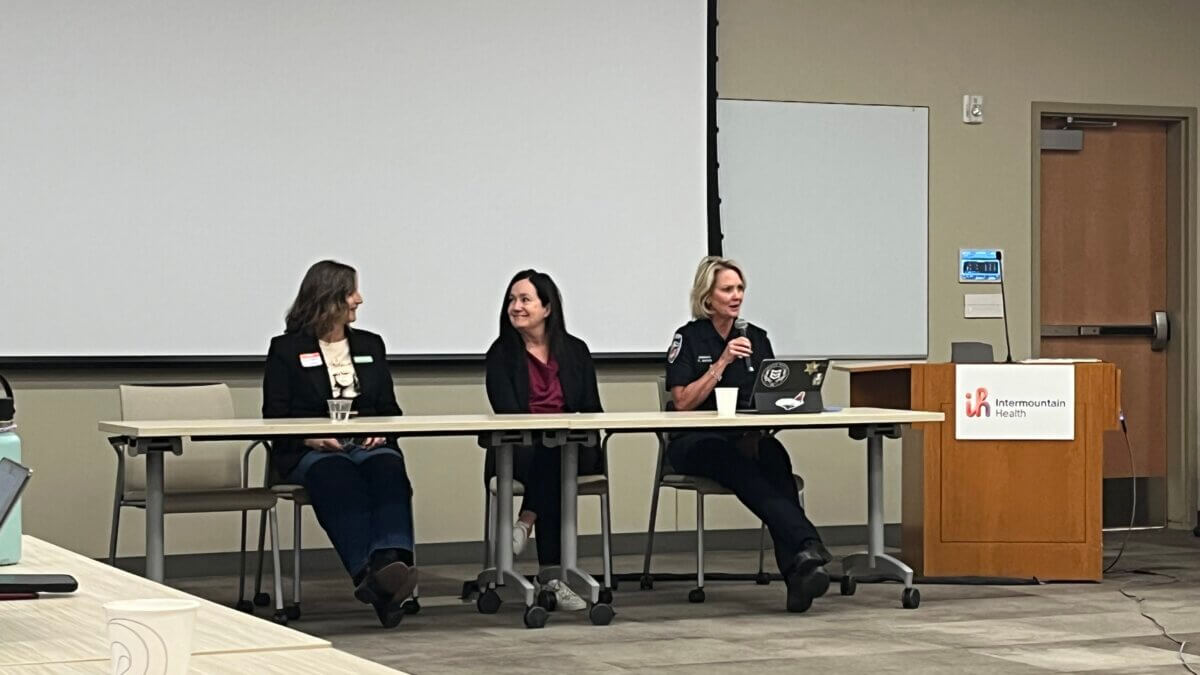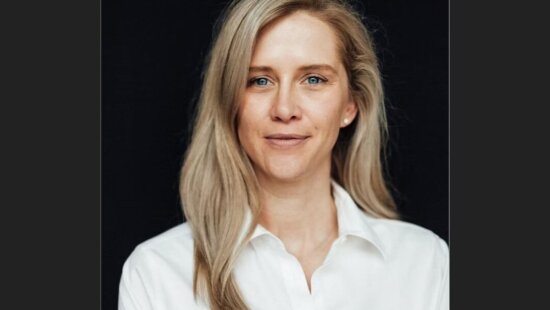Community
Summit County leaders join ‘A Bolder Way Forward’ to help women and families thrive

Peace House Executive Director Kendra Wyckoff, Summit County Attorney Margaret Olson, and Summit County Sheriff Kacey Bates discuss community partnerships and trauma-informed law enforcement during the domestic violence panel at the Bolder Way Forward Summit County gathering, hosted at Intermountain Health on Monday morning. Photo: Rebecca Brenner
SUMMIT COUNTY, Utah — Local leaders, advocates, and business owners gathered Monday morning for Summit County’s first A Bolder Way Forward coalition meeting, co-chaired by Tana Toly, Katie Wilson, and Janna Young, to help connect local efforts to a statewide movement aimed at helping Utah girls and women — and their families — actually thrive, not just get by.
A Statewide Movement Comes to Summit County
The Utah Women & Leadership Project launched A Bolder Way Forward (BWF) at Utah State University as a coordinated seven-year effort to improve outcomes for women and families across the state. Its primary aim is to ensure that more Utah girls, women, and families not only survive but thrive, providing support for every woman’s safety, health, and well-being so she can pursue educational, professional, and civic opportunities with a sense of belonging and abundance.
The BWF framework utilizes the metaphor of a wheel, with 18 “spokes,” or focus areas, categorized under five broader themes: safety and security, health and well-being, home and family, workplace, and education/leadership. Each spoke represents a movement led by its own coalition, working collaboratively to create a greater impact.
Along the rim of the wheel are three overarching influences that touch every spoke: identity, culture, and male allyship. These remind participants that meaningful change requires intersectional awareness and collaboration.
Statewide, these spokes address challenges such as domestic violence, sexual assault, pay equity, leadership representation, child care, and political participation. The approach shifts from isolated programs to systems-level change, focusing on measuring actual outcomes rather than just activities.
Monday’s meeting brought the statewide framework down to the county level, with organizers choosing four focus areas for the coming year: child care, domestic violence, political representation and women’s entrepreneurship.
Deputy County Manager Janna Young, who helps lead Summit County’s coalition, shared that local partners decided to concentrate on four spokes this year. “These are areas where we see both urgent need and a real opportunity to make an impact,” she said.
Child Care: “Affordability is the Role of Government”
The child care panel, led by PC Tots Executive Director Sue Banerjee and Park City Chamber’s Senior Director of Community & Government Affairs, Becca Gerber, framed early education as both an equity and an economic issue.
Banerjee highlighted the disparities she observed as a substitute kindergarten teacher between children who had access to high-quality early education and those who did not, especially regarding early literacy, numeracy, and social-emotional skills. She outlined three pillars of quality: safe and stimulating classrooms, trained and fairly compensated staff, and strong communication with families.
“Teachers in early education are predominantly women and have historically been undervalued and underpaid,” she said.
Gerber emphasized that, in many parts of the U.S., child care now costs more than a mortgage or college tuition. She credited Park City and Summit County’s joint scholarship programs, which cap care costs at 10% of a family’s income, as “life changing,” but noted that affordability remains a systemic issue. “Affordability is the role of government,” she stated. “We all share the costs of roads and public safety. Child care is no different.”
Domestic Violence: Linking Safety to Systems
The domestic violence panel featured Summit County Sheriff Kacey Bates, County Attorney Margaret Olson, and Peace House Executive Director Kendra Wyckoff.
Bates described domestic violence as one of the most serious and underreported crimes affecting women, as well as the most dangerous type of call for officers to respond to.
Wyckoff discussed the lethality assessment protocol now used by law enforcement to identify high-risk cases and immediately connect survivors to Peace House’s 24/7 hotline. Since Peace House’s expansion, nearly half of survivors now transition from shelters into permanent housing, a significant increase from one-third before. However, she noted that survivors often remain “trapped by systems—child care costs, low wages, housing, and legal barriers.”
Olson added that children often witness abuse directly, highlighting that domestic violence in the presence of a child is now treated as a separate charge. “When law enforcement listens, believes, and supports women—not just in times of crisis but throughout their journey—we create stronger families and safer communities,” Bates stated.
Political representation and women’s leadership
Utah has never elected a woman as governor or U.S. senator, and women continue to hold a minority of legislative and local government seats. Locally, women serve on both the Summit County Council and the Park City Council, but representation is slipping.
Park City Council will have just one woman in 2026 — or two if a woman is appointed, should Council Member Ryan Dickey win the mayoral race. In 2022, the council included three women. The Park City Planning Commission has also seen a decline, now with one woman compared to three last year.
Speakers noted that having women at the table changes the tone and dynamic of decision-making, and many women don’t consider running until someone explicitly asks them. They encouraged attendees to view both elected and appointed positions as meaningful entry points into public service.
Park City School Board President Meredith Reed said she initially hesitated when encouraged to run. “But the very people who are thoughtful and reflective are exactly who we need in public office,” she said.
“Leadership doesn’t start when you win an election,” she added. “It starts the moment you say, ‘I’ll try.’”
Entrepreneurship and Business Culture
Sara Sergent, owner of Alpine Distilling, shared that she became an entrepreneur partly out of necessity — she wanted to secure health insurance for her child, who had a pre-existing condition. Today, her company offers flexible schedules, health insurance, and retirement benefits. “When team members feel supported,” she said, “they know they have a home.”
Other panelists highlighted initiatives like the Best Place for Working Parents survey, which the Park City Chamber is launching to identify and strengthen family-friendly workplace policies.
What’s Next for Summit County
The local Bolder Way Forward coalition has plans to:
– Set one “bold goal” for each of the four focus areas by the end of the year.
– Hire a part-time coordinator to support volunteer leaders.
– Form working groups focused on child care, domestic violence, leadership, and entrepreneurship.
– Connect county data to statewide dashboards that track goals for 2026 and 2030.
Organizers stressed that the vision is not about advancing women at the expense of men, but about building stronger families and communities. Their closing message was simple: pick a focus area, join a working group, and contribute in any way you can — because when women and girls in Utah thrive, everyone benefits.



















